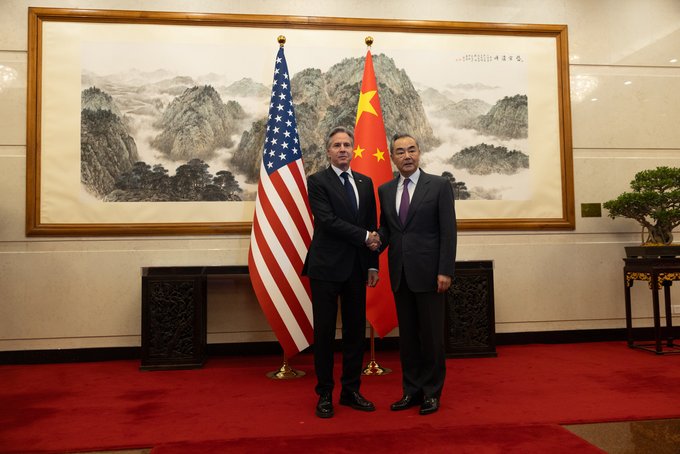Chinese Foreign Minister Wang Yi warned his American counterpart, Antony Blinken, not to cross China’s “red lines” during a meeting between the top diplomats of the two countries in Beijing on Friday.
Mr Wang opened the meeting with a question which sounded more like a warning: “Should China and the United States keep to the right direction of moving forward with stability or return to a downward spiral?”
The China-US relationship is beginning to stabilise, but it is still being tested by “negative factors”, he added.
Mr. Blinken, who is visiting China for the second time in less than a year, is scheduled to conclude his trip with a meeting with China’s President Xi Jinping on Friday afternoon.
The announcement of Mr. Blinken’s meeting with President Xi came just hours before it was set to occur.
Earlier on Friday, Mr. Wang issued a warning that the two countries could either choose cooperation or face confrontation, and possibly even a descent into conflict.
He outlined what he termed China’s red lines concerning its sovereignty, security, and development interests, cautioning the U.S. against crossing them.
“Negative factors in the [US-China] relationship [are] still increasing and building, and the relationship is facing all kinds of disruptions,” Mr Wang said.
“China’s legitimate development rights have been unreasonably suppressed and our core interests are facing challenges,” he said.
Mr Wang did not specify these challenges, but there are several sensitive flashpoints between the two superpowers, including their positions on the South China Sea, US support for the government in Taiwan, and human rights.
Mr Blinken was more circumspect in his remarks to Mr Wang in front of the press.
Beijing and Washington have a shared responsibility to move ties forward with “active diplomacy”, he said.
Nonetheless, he stated that he would be forthright and clear about the differences between their countries to prevent any misunderstandings in what he described as the world’s most important bilateral relationship.
These differences were underscored earlier in the week after Washington approved its latest aid package, which included military assistance to Taiwan, drawing sharp rebukes from Beijing, which condemned it as a “serious violation of the one-China principle.”
China views Taiwan, a self-governing island, as a breakaway province destined to come under Beijing’s control, whereas Taiwan regards itself as independent.
Mr. Blinken’s visit also follows shortly after the US enacted legislation compelling the Chinese-owned TikTok to either sell the widely popular video app or face a ban in America.
Privately, the US has been cautioning Beijing against shipping components to Russia that are allegedly used to manufacture weapons for the conflict in Ukraine, with the possibility of sanctions looming over these discussions.
This trip is part of a broader effort to enhance dialogue and diplomacy—despite ongoing tensions—between these competing global powers, aiming to stabilize relations after significant strain last year.
In a conversation earlier this month, US President Joe Biden and Mr. Xi explored areas of potential cooperation, such as addressing climate change and combating narcotics.
However, their discussions revealed disagreements over the US’s support for Taiwan and technology trade restrictions.


